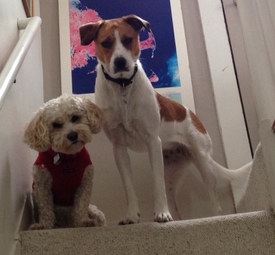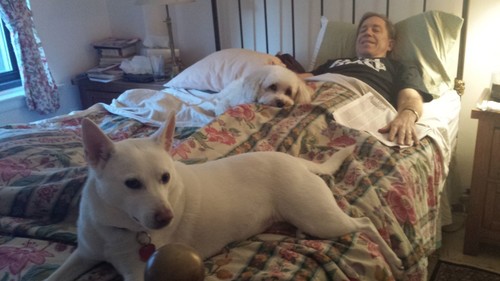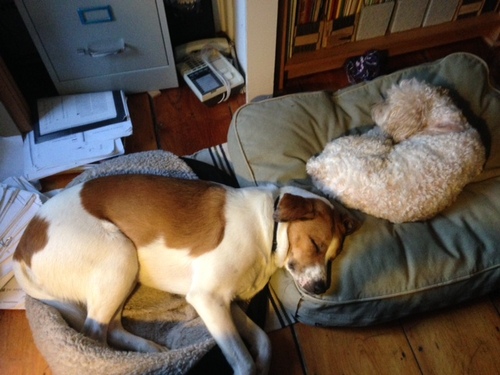
 There are many websites full of helpful information about how to travel with your dog. We can take our dog, Dino, on car trips, but on a month long trip to Southeast Asia that included a 40 hour air travel marathon, a 13 night cruise, and three months living in Honolulu, it just didn't seem possible. As a 27 pound cockapoo, Dino isn't a dog who "fits under the seat in front of you", so even assuming everything else could be arranged, I couldn't see putting him crated in an airplane cargo hold for 16 hour trans-Pacific flights or in the holds of planes run by airlines in countries where they eat dogs.
There are many websites full of helpful information about how to travel with your dog. We can take our dog, Dino, on car trips, but on a month long trip to Southeast Asia that included a 40 hour air travel marathon, a 13 night cruise, and three months living in Honolulu, it just didn't seem possible. As a 27 pound cockapoo, Dino isn't a dog who "fits under the seat in front of you", so even assuming everything else could be arranged, I couldn't see putting him crated in an airplane cargo hold for 16 hour trans-Pacific flights or in the holds of planes run by airlines in countries where they eat dogs.
Some of my dog loving friends just won't make a trip unless they can bring their dog. I totally understand how they feel. Missing Dino has had me fawning over other people's dogs in elevators, on the street and in parks all over the world. I can pantomime "May I pet your dog?" in many languages.
Some might consider me selfish, but I want to have a dog to love and care for and I want to indulge my wanderlust. For those who find themselves in similar circumstances, here's how to travel without your dog:
1) Acquire a dog to love. We adopted Dino from the SPCA, but you might also be adopted by a stray dog, or buy one from a reputable breeder. (Some might argue there is no such thing. I disagree.) Don't buy one from a pet store or a puppy mill where dogs are bred in terrible conditions.
2) Make sure your dog is socialized with other people and with other dogs. If your dog loves only you, traveling without him/her is going to be a terrible strain on both of you. If your dog is great with people, but not so good with other dogs, this will limit your options, but they still exist.
If you have taken care of #2, then you have the following options:
- You take care of our dog. We'll take care of yours. Walking a dog is a great way to meet the neighbors, especially those with dogs. Even after moving to Center City Philadelphia, we still trade dog sitting with our former neighbors in the suburbs.
Annabelle (foreground) joins the pack when she stays with us.
- Have someone stay in your home with your dog while you're away. If you know people with dogs (and it's hard not to if you take your dog for walks in your neighborhood), chances are they can recommend someone they hire to stay at their home and care for their dog when they're away. This is the optimal arrangement if your dog is most happy at home and doesn't get along with other dogs. However, it is also the most expensive option. There are also websites where you can be matched up with people looking to house sit who are animal lovers also willing to pet sit. Participants on both sides of these arrangements have usually been vetted (pun most definitely intended) and this can be a win-win financially for everyone.
- Have your dog stay with someone who boards dogs at their home. Before we knew someone with whom to trade dog sitting, this is the option we used. Through another dog owner, we found a dog loving couple with a stay at home wife who took a few dogs at a time into their home. They had a big fenced in back yard and Dino was treated like a family member. This was not an inexpensive option, but I'd rather stay in a less fancy hotel on a trip and spend the money to know our dog was well taken care of and content.
- Board your dog at a kennel or "doggie hotel". This wouldn't be my first choice because boarded dogs aren't living in a very homey situation -- although some higher end boarding facilities have fancy dog beds in little pet apartments that might even include a television. Usually, you pay additional fees for extra walks, play time with other dogs or extra time with a caretaker. If you board your dog at a facility where they will be exposed to other dogs, a rabies certificate and a bortadella vaccine for "kennel cough" are vital and probably required. If your dog goes to a doggie day care, they usually also offer boarding services and this is probably the arrangement that would give you the most peace of mind because you know the staff and your dog is familiar with them and the surroundings.
- Totally luck out like we did and have dog loving relatives who also have a dog and who are willing to take care of and love your dog for four months while you're away!
Dino and his dog cousin, Izzy, like to trade beds.
If you find the right situation for your dog, you will still miss them, but you'll know they're happy and well cared for while you're away.
Resources:
My favorite blog about traveling with your dog: Montecristo Travels (Montecristo is a 3.5 pound long-haired chihuahua who has travels extensively in Europe and North America with his people.)
Housesitting websites: These websites were recommended by Boomer Travel Bloggers who have done housesits that also involved caring for pets: Mind My House; Trusted House Sitters
Dog Home Stays: Dog Vacay has good references and provides contacts for boarding your dog in homes in your area. I have never used them, but I would consider trying them if the need arose.
[A version of this post first appeared on Boomeresque]

